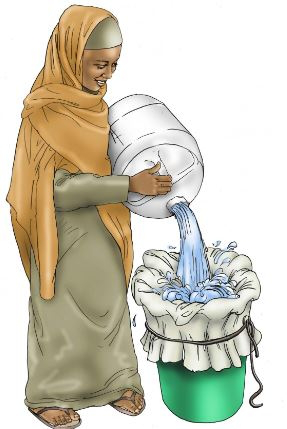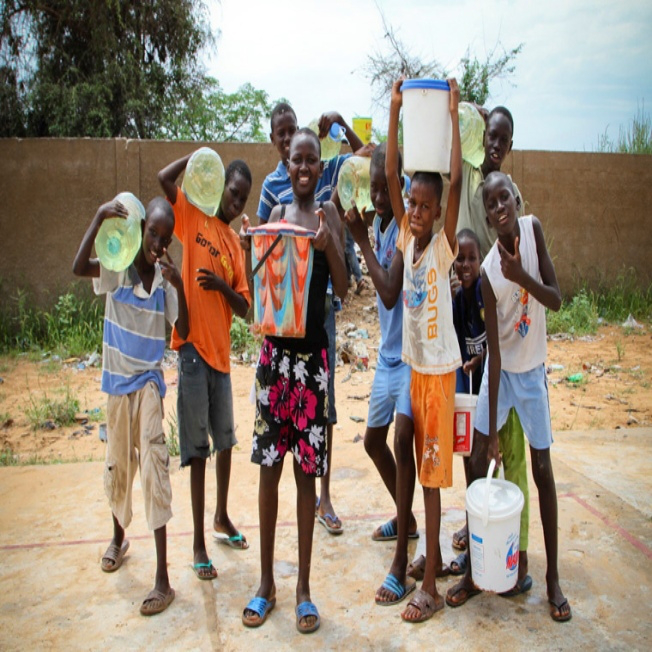
Kenya's progress towards achieving Sustainable Development Goal 6 has been slow, with only 59% and 29 % water coverage and sanitation, respectively (JMP, 2019). Sewered sanitation is currently available to only about 3.9 million people in 26 counties with 61% of this being within Nairobi City County. This, therefore, implies that 21 counties lack any systems for waste management (WASREB, 2020), whilst funding for sanitation remains low. With less than ten years to go, Kenya must act fast if it is to achieve water and sanitation for all by 2030.
Women and youth are largely responsible for household water, sanitation and hygiene management and bear a disproportionate burden when these basic services are lacking. However, they are often left out of critical discussions and decisions relating to water and sanitation.
There is evidence that women and youth participation in water and sanitation decision-making and governance can lead to their social and political empowerment and can enhance performance outcomes for the household and community.
There is a need to invest in developing the next generation of water and sanitation leaders through fostering partnerships among training institutions, water utilities and counties to encourage professionals to study water and sanitation, and water resource management, and move into technical and leadership roles.
Overall Goal
The overall goal of the conference will be to enable stakeholders to share good practices, deliberate on prevailing challenges, and formulate strategies to leverage youth and women potential in order to accelerate realization of universal access to potable water and safely managed sanitation services.
Conference Theme
Unlocking potentials of Women and Youth for sustainable water and sanitation services
CALL FOR ABSTRACTS, EXHIBITORS & CONVENOR SESSIONS
Deadline for submission: Extended to March 30th, 2021
Submissions are welcome for Exhibitions, Oral and Poster presentations. To apply for a Convenor sessions, please download "Convenor Session Application form" and send completed form to waspaywc2021@gmail.com
Download Convenor Session Application Form
CALL FOR YOUTH & WOMEN INNOVATION AWARD
The award seeks to recognize innovative solutions from youth and women in Kenya that promote access to water and sanitation services that make a difference in promoting healthy, safe, and productive lives for all. For more information see here.
Specific Objectives
- To create a platform to share experiences, identify barriers and good practices enabling information-sharing, transparency and participation of youth and women in the water and sanitation sector
- To provide networking opportunities for innovative investments and partnerships for youth and women to accelerate access to water and sanitation for all
- To explore technologies, innovations and markets opportunities for youth and women to improve availability and access of clean water and safe sanitation for all
- To foster partnerships among training institutions, water utilities and counties to building capacity of next generation of water and sanitation leaders.
Conference Sub-Themes
The conference objectives will be achieved through the following conference sub-themes informed by the United Nations' SDG 6 Global Acceleration Framework, the Kenya Vision 2030 and the Big 4 Agenda.
1.Promotion of good governance in water and sanitation through inclusion of youth and women
- Succession and mentorship management for youth and women in the water and sanitation sector
- Role of youth and women in water and sanitation governance
- Operationalizing gender-rule & youth inclusion in water and sanitation policy & governance of water sector institutions
- Public participation in water and sanitation sector: Role of youth and women
- Last mile connectivity of water & sanitation services: Role of youth and women
- Water conservation & wastewater management: Fundamental role of youth and women
- Accountability and responsiveness for water and sanitation services
- Engaging and regulating informal actors in water and sanitation sector
- Opportunities for women and youth under devolved governance system

2.Innovative and optimised financing opportunities for youth and women to accelerate access to water and sanitation for all
- Household investments: (changing water- use habits)
- Private sector investments
- Public Private Partnerships
- Blended financing
- Youth and women-led approaches in addressing water and sanitation challenges
3.Capacity Development and Research to optimise the untapped youth and women potential
- Training, Capacity building, mentorship and coaching opportunities for the youth and women
- Linking academia with the water and sanitation industry/private sector
- Skilling the water and sanitation workforce
- Optimizing existing capability of youth and women for the water and sanitation sector
- Role of technical and vocational training for WASH human resource capacity development
- Funding opportunities for research and capacity building in water and sanitation
4.Leveraging Big Data and Information in water and sanitation by youth and women for accelerated access to water and sanitation
- Leveraging Big data and information to improve water operation in utilities
- Leveraging digital technology and data science for better water resource management and wastewater utility operations
- Addressing data gaps in water and sanitation sector (open source resources, access, ownership, protection, data costs)
- Youth and women contribution in big data and information in the water and sanitation sector
- Geospatial applications in the management of Water and sanitation (non- revenue water, sewerage, water resources)
5.Innovations, Technologies and Markets opportunities for youth and women to improve availability and access of potable water and safe sanitation for all
- Water and sanitation for urban and/or rural
- Water resources management
- Treatment, recycling and re-use of wastewater
- Conserving and recovery of energy from wastewater
- Decentralized approaches to wastewater treatment and management
- Faecal sludge management
- Green energy for water utilities
- Entrepreneurship and market opportunities for youth and women in water and sanitation
- Water vending and kiosks
- Emerging technologies in water and wastewater processing and infrastructure
- Standards and regulations of emerging technologies in water and wastewater
6.Health and Environment: Epidemic/Pandemic, Emergency and Climate Change preparedness and recovery in Water and Sanitation sector
- Building back better: Lessons learnt and Post covid-19 recovery in water and sanitation (designs of water systems, water and sanitation safety planning)
- Emergency planning and resilience for
- Ministries and agencies
- County governments
- Water utilities
- Development partners
- Learning institutions
- Research institutions
- Health institutions
- Private sector
- Non-governmental Organisations and Community Based Organizations
- Civil Society Organisations
- Climate change emergency preparedness